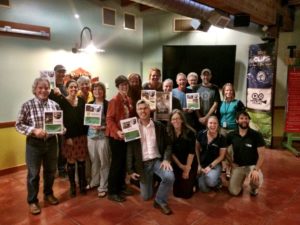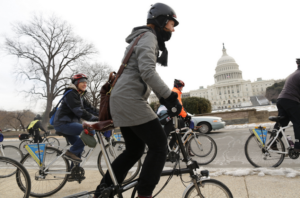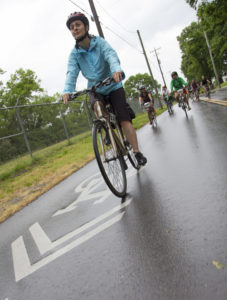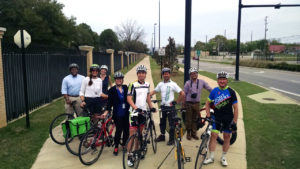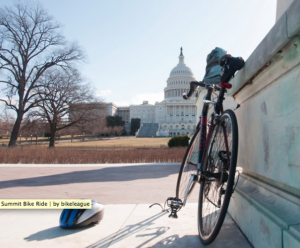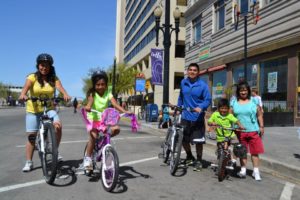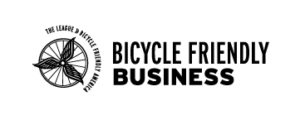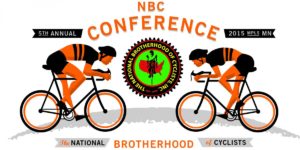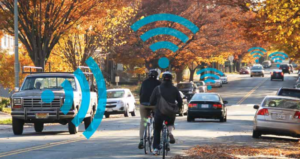Blog
Admittedly, we have an unfair advantage in Fort Collins. With New Belgium Brewing Company being the drum major of the literal and metaphoric bike parades in our town, the bar was set high a long time ago for what it means to be a bicycle friendly business. To a large degree, New Belgium is responsible for the creation of our city’s bike culture and identity, and for demonstrating that bikes are good for business. For Kim Jordan and Jeff Lebesch, founders of New Belgium, this was a key part of their corporate plan and culture goals when they founded the company nearly 25 years ago. And, now in its 16th season, the company’s Tour de Fat festival — taking places in 11 cities in 2015 — has raised nearly $4 million for bicycle non-profits nationwide. So, in a spirit of fairness, perhaps Fort Collins should have been issued a handicap before we were announced as the new top-ranked city for the most Bike Friendly Businesses.
Read More →This morning the Senate Environment and Public Works Committee met to debate and discuss the DRIVE Act, the Senate’s proposed transportation bill. The hearing today was a feel-good show of bi-partisan support and compromise for a long term transportation bill. The Committee rightly congratulated its leaders (Sens. Jim Inhofe, Barbara Boxer, David Vitter and Tom Carper) for moving the conversation forward on the need for a long term and sustainable transportation bill. While the Committee discussion today was uneventful, it marked the end of a whirl of activity for the Committee members in terms of amendments to the bill — some of which improve the bill significantly from a biking standpoint. Roughly 30 amendments we filed on Tuesday, and a few key ones were passed through by the committee leadership and the committee as a whole. Read our analysis of the original bill here. Here are the new changes that are good for biking.
Read More →Nashville is incredibly proud to be recognized as a Bicycle Friendly Community. In the past 10 years, we have seen enormous improvements in our city’s walking and biking infrastructure. We now have a Complete Streets policy ensuring that new roads take into consideration all road users; we have a full-time Bicycle Coordinator in Public Works and a full-time Active Mobility Planner in Planning; we have a thriving bike share program; we have been rapidly expanding our greenways and bikeways; and we have seen growing commitment throughout the city to ensure that all Nashvillians can choose healthy, active transportation. However, this award also provides us with a wonderful opportunity to reflect on the work we still have to do as a community. The League’s Bicycle Friendly Community program gives Nashville some clear goals to strive towards improving the bicycling culture in our community.
Read More →I’m not despairing because in the past three days I’ve met with several mayors and numerous council members, and strategized with dedicated staff and advocates. I’ve had loaner bikes delivered from three different bike stores, and drank free craft beer and pizza at a bike center. I made the front page news of The Anniston Star, and even got to join 30 club riders on a Tuesday evening ride! And I won’t even tell you about my trip down to Fairhope to deliver an evening presentation or the special reception hosted by Alabama Bikes. Dear reader, if you think I’m just making the best and enduring a challenging stretch of my journey across the country, making visits to cities and towns that could never be mistaken for Bicycle Friendly Communities, you would be wrong. In fact, the opposite is true.
Read More →As is evident in the acronym, The Developing a Reliable and Innovative Vision for the Economy Act, or DRIVE Act, is not focused on improving multi-modal transportation but rather on the interstate and highway system. The U.S. Senate introduced its version of the new transportation bill this week and it is set for a hearing on Wednesday. While we were successful in getting some small changes to the Transportation Alternative Program (TAP), we do not see any real innovation or vision to really grapple with transportation needs of this 21st Century.
Read More →What does this award mean to you and to Salt Lake City? This award is an affirmation that Salt Lake City is on the right track. The City’s Transportation Division has been working tirelessly to implement progressive infrastructure projects and new programs to get more people riding. There is still a long road ahead to create a city where all people feel comfortable riding, but the silver designation serves as an important benchmark and an opportunity to refocus efforts among the city staff and bicycle advocates.
Read More →Earlier this week, we re-launched the new and improved Bicycle Friendly Business application, and it’s got a lot of exciting improvements. Since the Bicycle Friendly Business program originally launched in 2008, nearly 1,300 businesses have applied, and over 960 businesses have been awarded the BFB designation. Like the other Bicycle Friendly America programs, BFB applications have been on the rise in recent years, and we don’t expend this trend to change any time soon. Here at the League, we have been thrilled to see growing enthusiasm for bicycling from among the private sector, and so we’re working hard to accommodate continued growth in demand for the BFB program.
Read More →The National Brotherhood of Cyclists (NBC) 5th annual national conference is coming up: From July 15-19 advocates from across the country will travel to Minneapolis, MN, to discuss “Equity in Motion.” The League is a sponsoring organization for the fifth annual event. We caught up with organizer and vice president of the NBC, Anthony Taylor, to discuss what’s on the docket for the upcoming national summit and what attendees can expect. Learn more about and register for the event at www.thenbc.bike.
Read More →Connected and automated vehicles are two distinct technologies that have the potential to revolutionize automotive travel and road safety for everyone — and they’re likely to enter our roadways in just a few years. Connected vehicles can “talk” to each other, exchanging information like speed, brake force and direction. Automated vehicles control driving functions, either relieving a driver of a function or augmenting a driver’s ability.
Read More →In February, I was invited to attend both the World Bicycle Forum in Medellin, Colombia, and the League’s National Bike Summit in Washington, D.C. As the only African represented at both these forums, it was with great curiosity that I presented to and gleaned knowledge from those who have navigated the advocacy space for much longer than me. Initially almost every workshop session and talk in Medellin bore reference to Copenhagen. From gender split to trip generation percentages — with the requisite baguette and basket imagery, of course! — it was always there. Until a question from the audience changed everything. “Can we please talk about our own country and let Copenhagen be?” A nervous bundle of applause cascaded into a unanimous agreement from the 2,000 strong auditorium of advocates, activists and all those positioned somewhere in between. Thinking had shifted. It was a coming out of sorts: a great day for change makers in the Global South.
Read More →